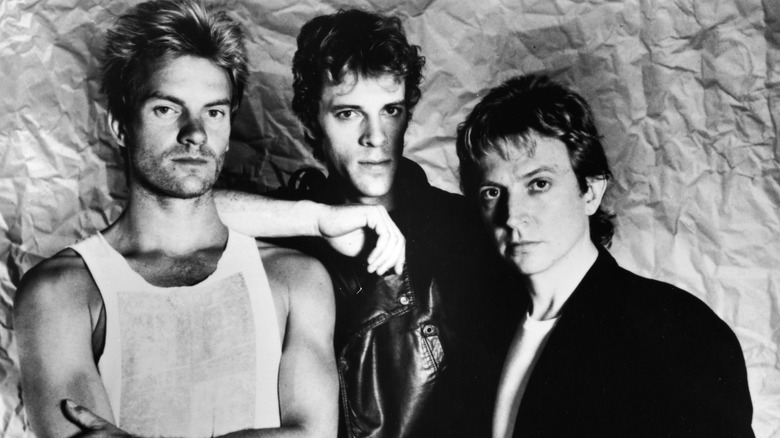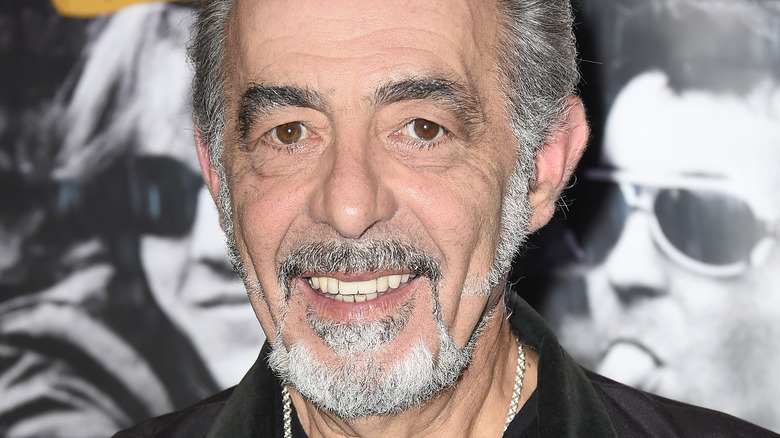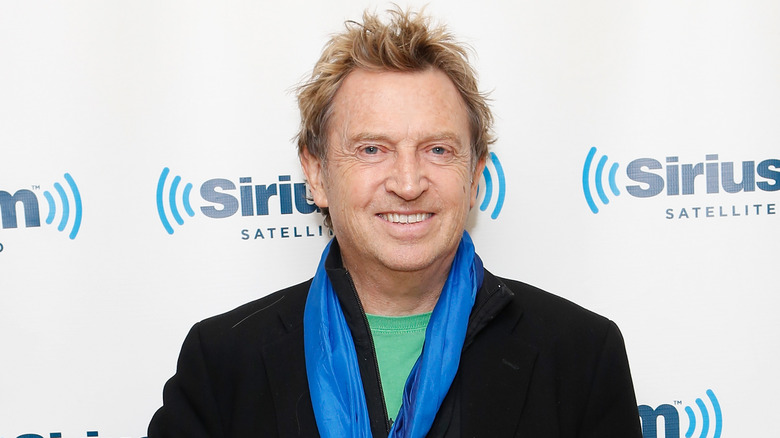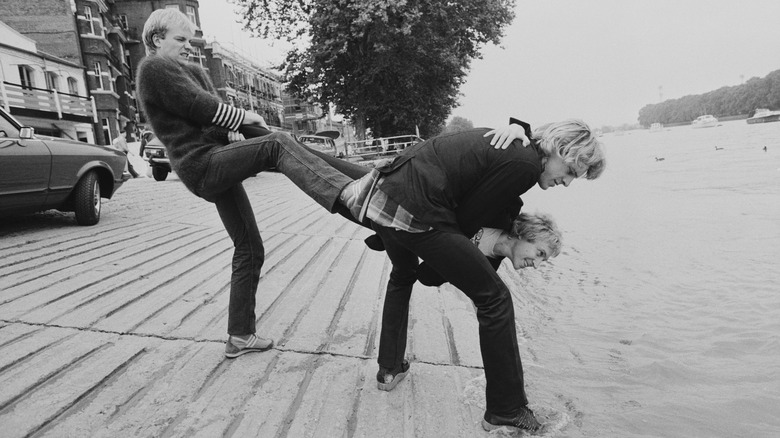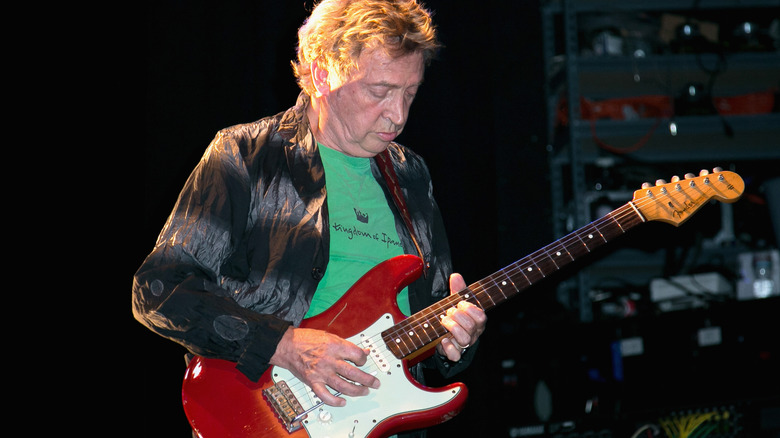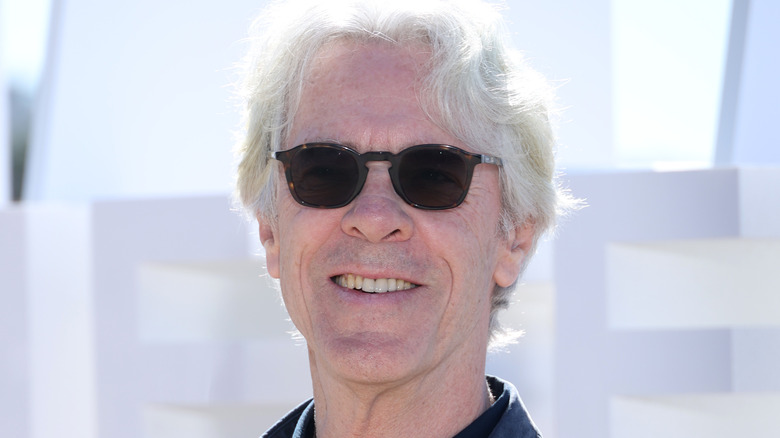Sting's Former Bandmates Have A Lot To Say About Him
In the summer of 1983, the Police — singer and bass player Sting, guitarist Andy Summers, and Stewart Copeland, the drummer — had been together for seven tumultuous years. They were on a world tour to support their hit album "Synchronicity" but it appeared that this was the end of the road. "Sting has been muttering about how this is the time to stop, to get off, to quit at the high point of the curve," Summers recalled in his book "One Train Later: A Memoir." He had agreed with Sting in theory but still felt the imminent break-up of the band was "devastating." By then the Police had gone from a "fragile democracy" to a "dictatorship" because of Sting, he told the Associated Press.
For Copeland, being in the band had become a "hell on earth" and a big part of that was due to Sting's controlling nature."The times when I came the closest to homicide, the times when it became absolutely critical that I choke the life out of this man, were when he would come over to me and tell me something about the hi-hat," Copeland told the New York Post in October 2023.
The original guitarist
In the summer of 1977, American ex-pat Stewart Copeland formed the Police with French guitarist Henry Padovani in London amid the burgeoning punk scene with Sting (born Gordon Sumner) coming aboard as the singer and bass player. Sting had come from Newcastle and had a jazz background. "He was confused – he felt that he had to forget all he had learned musically and instead scream, jump around and play fast," Padovani told Guitar World in December 2023. "But he gave it a try because Sting is a guy who always keeps his options open. And in that moment, he had nothing else."
A month later, Sting invited Andy Summers to join the band, leading to the first of many stormy situations for the Police. "Andy was good, but the vibe was different, and it became apparent that there was a Stewart-and-me camp and a Sting-and-Andy camp, both going in different directions," Padovani recalled. The Sting-Summers camp won out. Following a tense recording session, Sting fired Padovani, a move that Copeland didn't agree with.
Guitarist Andy Summers
When Andy Summers, the only member with real-world music experience, joined the band, he brought a new sound to the Police that "immediately interested Sting" who "had the ears for it. Maybe because he kind of came out of a jazz-rock background and he's a great natural musician," Summers recalled on "The Jeremy White Show" podcast.
During the Police's seven-year existence which included five albums, five Grammy Awards, and a string of hits, Andy Summers discussed his bandmate Sting and the band's chemistry in a conciliatory manner. "Well, we're all very disparate personalities," Summers told The Whig-Standard in September 1982. "Actually, I am the most fiery of the three of us. Sting is the coolest — he's the most introverted." Following the band's break up, Summers alleged that as time went on Sting became dictatorial. In 1980, Sting refused to play on one of Summers' songs, "Behind My Camel," (which appeared on their third album "Zenyatta Mondatta"). Sting hid the tapes from Summers after the guitarist recorded all the parts on his own.
Drummer Stewart Copeland
Like Andy Summers, Stewart Copeland was more diplomatic when the band was still together. In the September 1982 interview he told the AP that all three of the members had equal say in what songs they chose to record. "Sting has to fight for his songs, too, but when you hear a song like 'Every Little Thing She Does is Magic,' what are you going to say?" Copeland said. "When you hear a song like that, you play it." He went on to praise Sting's songwriting and squelch any talk of tension between them. "I don't hate Sting, and I don't sit here green with envy," he said." But I wish I'd written 'Message in a Bottle'."
Toward the end, tensions were running high between Copeland and Sting so much so that just before an August 1983 performance at Shea Stadium in New York City what started as horsing around ended with Copeland cracking Sting's ribs as they wrestled over a copy of The New York Times. Working with Sting had become unendurable for the drummer. "We now understand where all that tension came from. And in fact, given that understanding, I'm very grateful that we got as many as five albums out of Stingo, because by then ... he had a very clear idea of how the arrangements should go," Copeland told the New York Post. "At first, it was collaboration. It became more and more compromise for him — and it got tougher and tougher for him to make those compromises."
Andy Summers post-break up
In the 40 years since the Police broke up, Andy Summers has tempered his view a bit on his former bandmate. "I really believe that at the end of the day, there's great love and brotherhood between us because we all experienced something quite incredible," Summers told the Associated Press in 2015. He called Sting "a very gifted artist and a great musician" and said he "only" has "great respect for him."
Even so, Summers and Sting are still wrangling over who should get songwriting credit for their mega-hit "Every Breath You Take." In October 2023, Summers told "The Jeremy White Show" that the issue was still "very much alive" and hinted at a possible lawsuit against Sting. "Watch the press. Let's see what happens in the next year," he said. According to Summers, Sting had abandoned the tune and told him to "make it" his "own," which Summers did by creating the singular guitar part that breathed life into what would become one of the band's biggest singles.
Stewart Copeland gets revenge
In 2021, Stewart Copeland toured with a symphonic music project he called "Police Deranged for Orchestra." The show reimagined Police songs — a "frenzy of cutting up Police songs" — which Copeland jokingly referred to as "revenge" against Sting. "Let's call it by its true name," he told The Atlanta Journal-Constitution before admitting he and Sting had "a good relationship" concerning the touring show. "He loves to have people cover his songs," Copeland said. "It makes him feel like one of the great songwriters, which is one of the things he's most proud of." The drummer called his former bandmate's songs "perfect."
The Police reunited for a tour in 2007 and 2008 and Copeland hasn't nixed the idea that they could do it again. "We all get along really well and we're all still in fine fettle," he told Classic Pop. "Since we've been through the wars together and we don't have any reason to fight anymore, we get on great."
